QuestionI have had many of dogs in my life and never had problem house training them. We bought Rockie as a puppy started out doing the standard things in house training, putting out side regular, rub the nose saying no no then putting him outside, newspaper by the door, etc. When that didn't work many people recommended crate training which I never have done in the past, but gave it a try. Put a blanket in the crate knowing the are borrowing dog and need this type of environment. Rockie would bark all day and I mean all day, he barked so much that he coat would be all sweaty. In addition he would go crazy inside the crate and started chewing the plastic tray in the bottom of the crate and I don't mean a small amount of chewing it was a large area in hopes he would chew is way out. After several weeks of that we finally gave up and started back to some of the old methods and truly nothing ever worked. When he was about 4(now he is 9) he developed seizures and now is he on medication which controls the seizures. I'm at the point I just can't handle the peeing and poop any more do you have any suggestions ? I've started looking at dog reduces to see if anybody will take him.
Thank you for your suggestions!
Janie
AnswerI think many people have trouble housebreaking puppies because so much off the instructions they have are poor. I think many puppies housebreak themselves despite the methods used. We have done a new puppy every year since 1991 and never had a problem. But then, we don't do things the way many others do. We started with instructions from highly experienced pros, and have added details based on our experience.
We do use a crate, but never leave the puppy in it when we can watch it. I can't promise what we do will work with a 9 year old with established bad habits. The timing is tougher too since an older dog can hold it longer. If it isn't used to relieving itself outside, it may take extensive walking for an older dog.
Much of housebreaking is not training the puppy, but making it easier for your puppy, you, and your carpet while its body to catches up to its instincts. At around 8 weeks when the puppy goes to its new home, the time from when it realizes it has to go, and when it can't wait any longer is a matter of seconds. Only time will fix that. You can hardly be expected to be attentive enough to avoid all accidents. There is no sense punishing the puppy for your inattention. It is not fair to punish you either, but you still have to clean it up if you didn't have the puppy outside in time.
Housebreaking starts before you get home with the new puppy. If you don't have a crate, buy one. I prefer the more enclosed, den like plastic ones. Skip the bedding. At first it gets wet, and later it can be chewed into choking hazards. A wire grid in the bottom will help keep the puppy up out of accidents at first. They are available with the crates, but expensive and hard to find. A piece of closely spaced wire closet shelving from a home supply place is cheaper. I am now using a plastic vegetable bin with plenty of holes drilled in the bottom. It helps block off part of the crate for the smaller puppy. If you already have a metal crate, covering it may help. Just make sure you use something the puppy can't pull in and chew. Dogs that start out in crates as little puppies, accept them very well. Never leave an unattended puppy loose in the house. If nobody can watch it, put it in the crate. I suggest letting the dog have its crate all its life. A crate needs to be just big enough for a dog to stretch out in.
Choose a command and spot you want it to use. The less accessible to strays, the less chance of serious disease. If it is a female, choosing a non grassy spot will avoid brown spots later. When you bring it home, take it to the spot and give it the command in a firm, but friendly voice. Keep repeating the command and let the puppy sniff around. Sometimes you need to walk it around to stimulate its body to eliminate. If it does anything, praise it. Really let it know what a good dog it is and how much you love it, and maybe a treat. Note, being out there not only means you can praise it, but it also keeps it from being snatched by a hawk. If it doesn't go, take it inside and give it a drink and any meals scheduled. A young puppy will need to go out immediately afterward. Go to the spot and follow the above routine. Praising it if it goes is extremely important. If it doesn't go, take it back inside and put it in its crate and try again soon. Do not let it loose in the house until it does go.
At first it is your responsibility to know and take the puppy out when it needs to go. It needs to go out the first thing in the morning, after eating, drinking, and sleeping. If it quits playing, and starts running around sniffing, it is looking for a place to go. Take it out quickly. You will just have to be what I call puppy broke until it is a little older. How successful you are depends on how attentive you are.
By the time most dogs are about 3 months old, they have figured out that if they go to the door and stand, you will let them out. The praise slowly shifts to going to the door. Some people hang a bell there for the dog to paw. If your dog doesn't figure this out, try praising it and putting it out if it even gets near the door. When you catch it in the act, give it a sharp ''Ah, ah, ah!'' and take it out. Clean up accidents promptly. I mostly keep the little puppies out of the carpeted rooms. Still I need the can of carpet foam sometimes. First blot up all the urine you can with a dry towel. Keep moving it and stepping on it until a fresh area stays dry. A couple big putty knives work well on bowel movements. Just slide one under it while holding it with the other. This gets it up with a minimum of pushing it down into the carpet. This works with even relatively soft ones, vomit, dirt from over turned house plants, or anything else from solids to thick liquids. Finish up with a good shot of carpet foam. Note, do not let the puppy lick up the carpet foam. Once the dog is reliably housebroken, your carpet may need a good steam cleaning.
Many people strongly strongly push cleaning up all evidence of past accidents. I am slower to suggest that. Dogs will return to the same spot if they can find it. When you see one sniffing the spot, that is your clue to run it out.

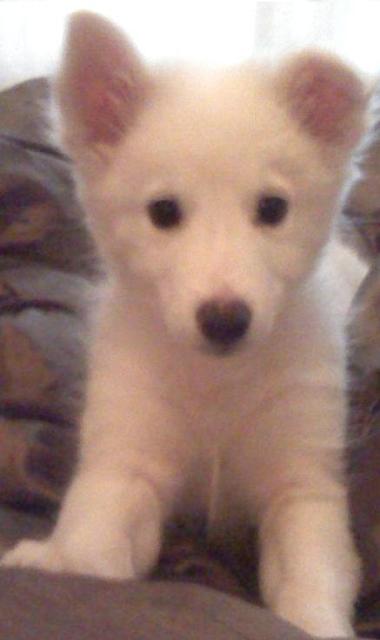 New Eskimo puppy
Question
Honey the shy american
I just got my 10 week o
New Eskimo puppy
Question
Honey the shy american
I just got my 10 week o
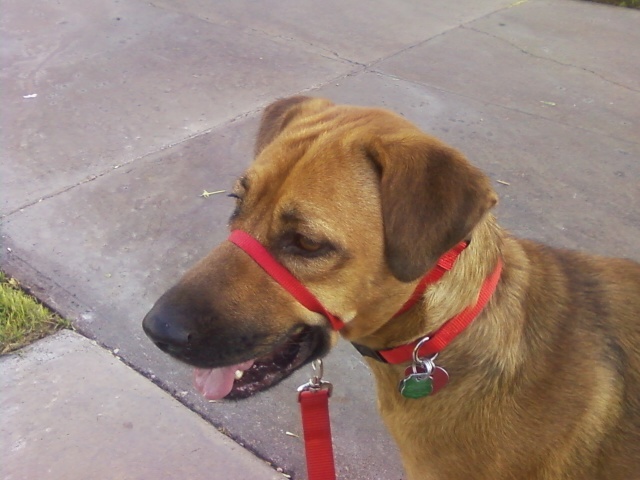 My dog Kiya
Question
Kiya
My new dog Kiya is a 2 yr old German Shep
My dog Kiya
Question
Kiya
My new dog Kiya is a 2 yr old German Shep
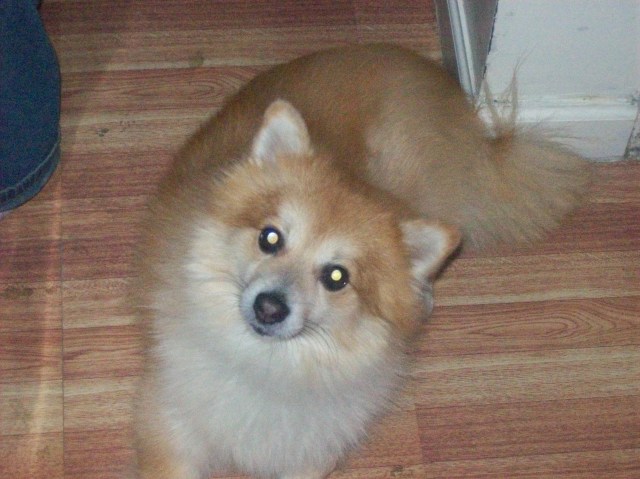 pomeranian
Question
the pomerainan
hey, i have a pom who is 3years
pomeranian
Question
the pomerainan
hey, i have a pom who is 3years
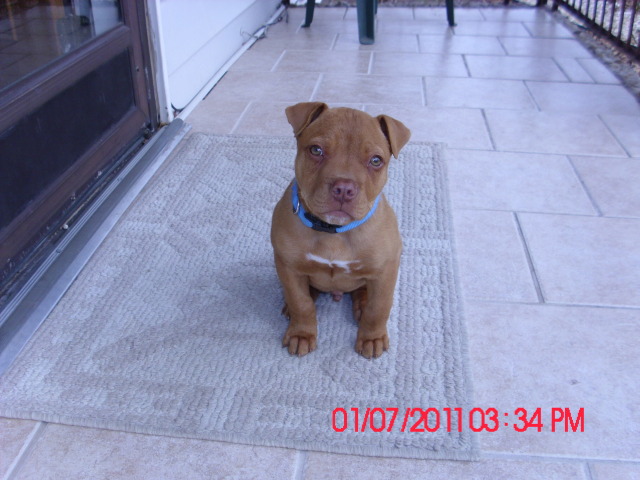 puppy medical concerns
Question
Rusty
my 11 week old red nose pit bull at time
puppy medical concerns
Question
Rusty
my 11 week old red nose pit bull at time
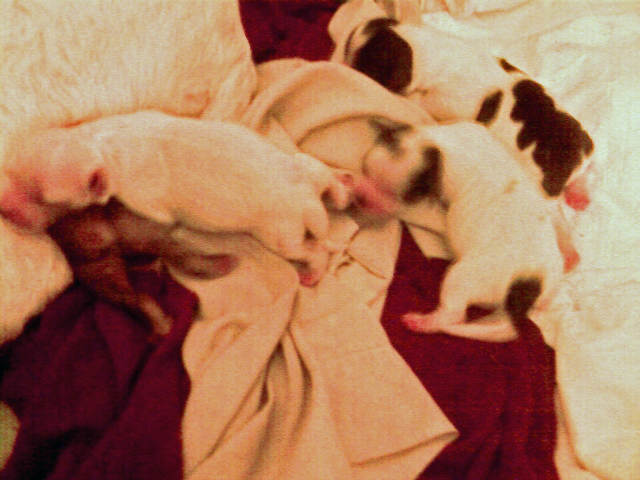 worried about mom dog not lactating enough
Question
angel and her pups jus
I have a small mixed br
worried about mom dog not lactating enough
Question
angel and her pups jus
I have a small mixed br